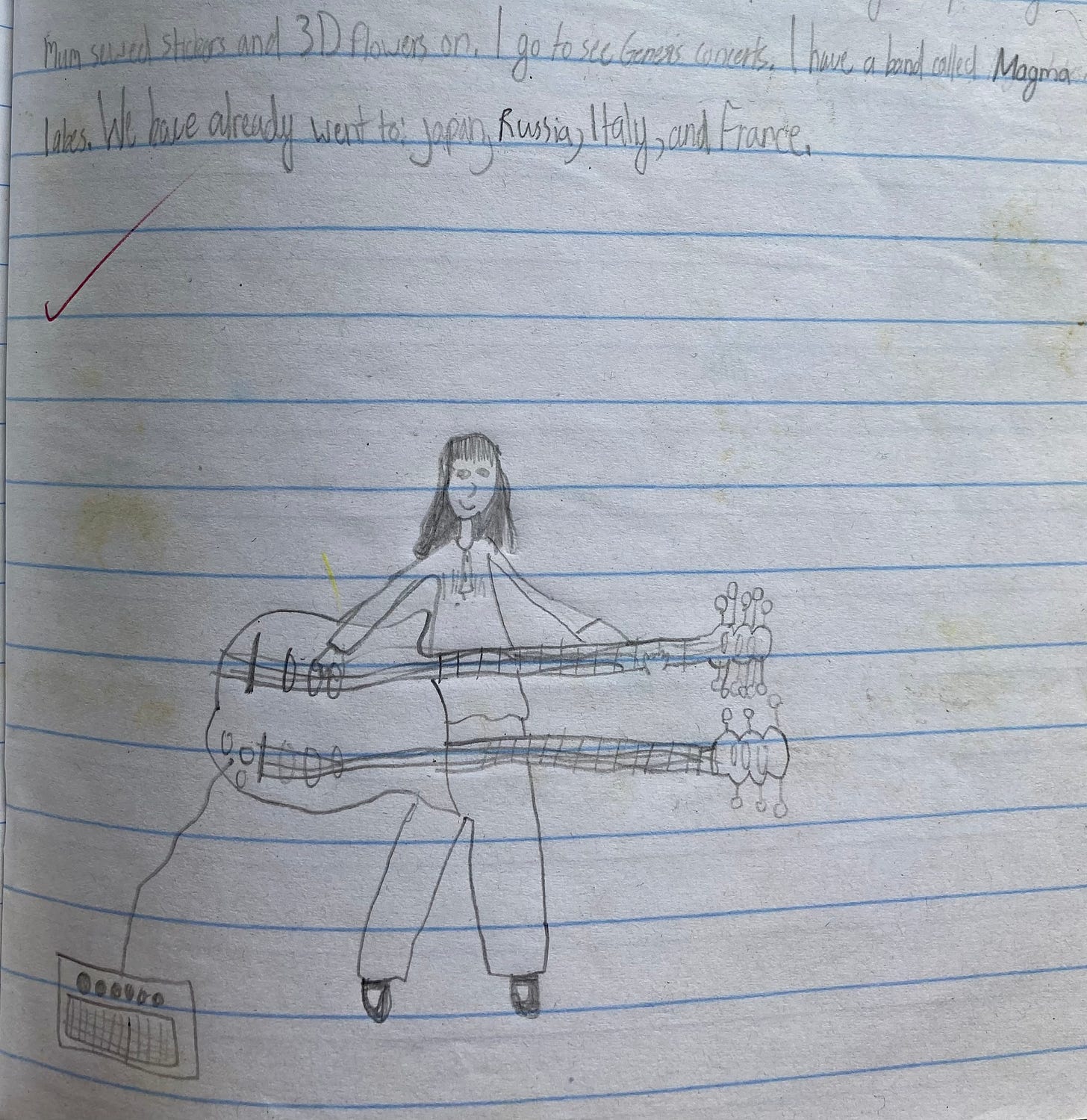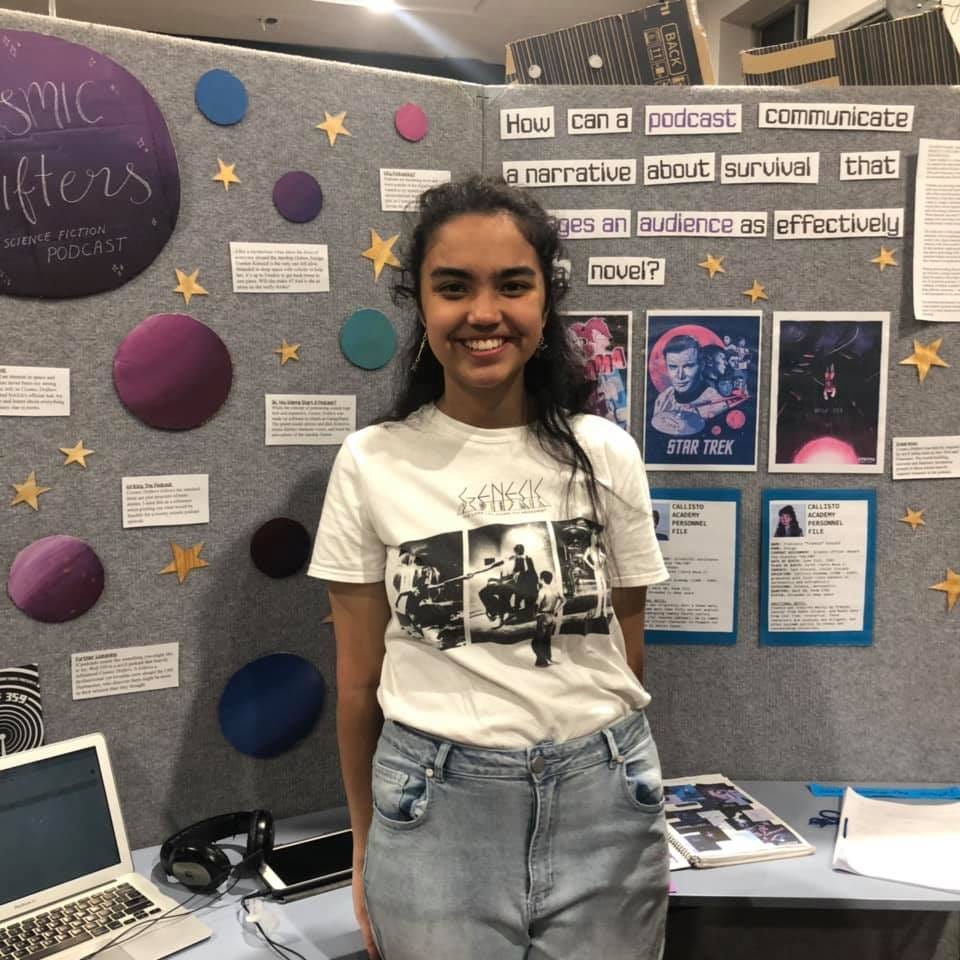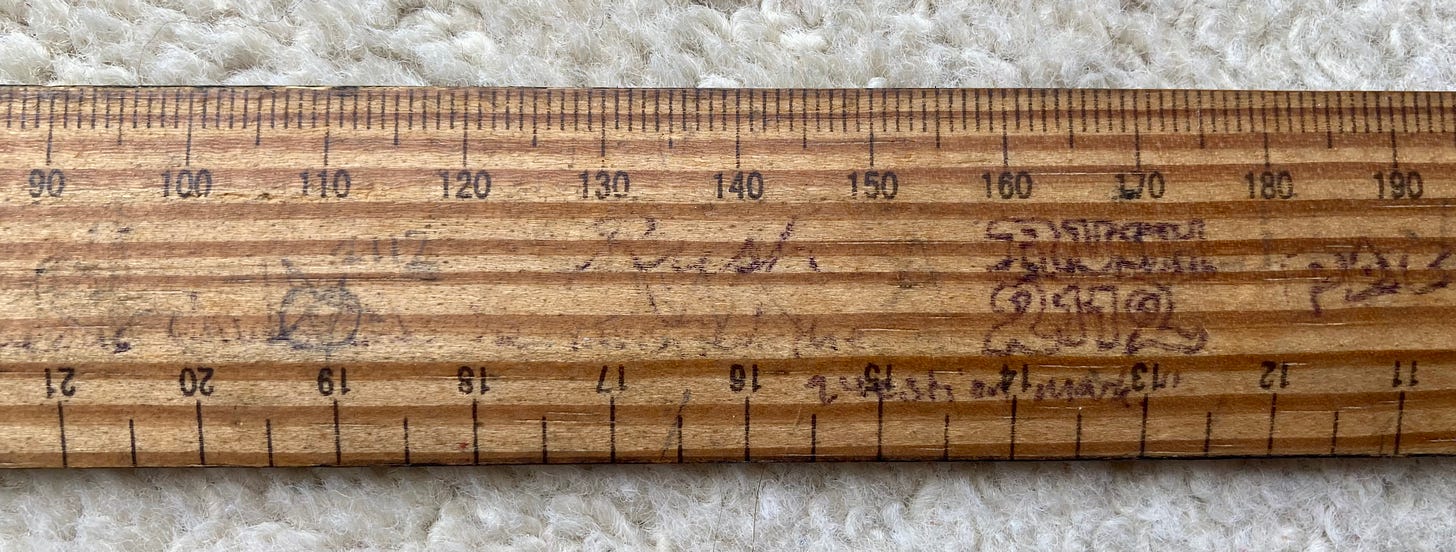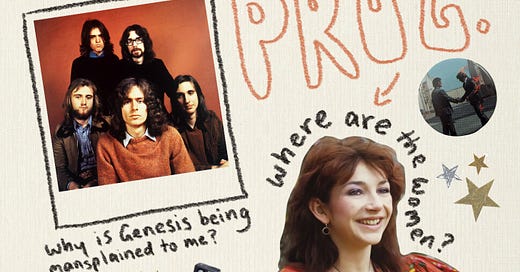The Boys' Club of Progressive Rock
My experiences as a woman within the male-dominated field of prog.
If I were to create a stereotypical progressive rock fan, it would go something like this: start with a generous helping of testosterone. Add three cups of nerdiness, followed by another cup of anti-social tendencies. A dash of self-consciousness. Chuck in a tablespoon of intellect. A teaspoon of recreational drug enjoyment, if you so choose. Finally, add a pinch of trivia accumulated from reading the various works of Tolkien and Bradbury. Stir until ingredients are well combined, and then bake until golden brown or a skewer comes out clean.
Since this is the age of TikTok and media literacy is at an all time low, I would like to once again reiterate that the above description is one of a stereotypical prog fan. Not all prog fans are made up of such a combination of ingredients, nor are all of them male. Case in point: me.
I was spoon-fed prog from the moment I exited the womb. Most, if not all of this, can be attributed to my dad, himself a huge fan of groups such as Rush, Genesis, and King Crimson. This love trickled down into my own tastes, until one day I asked my Year 2 teacher - herself a fifty-something Mancunian woman - if she’d ever heard of Genesis as they were my favourite band. I remember as a child drawing myself over and over again with a double necked guitar (a prog staple) and clothes vaguely resembling Mike Rutherford’s stagewear circa 1976.
When I was roughly 12 years old, I became a massive Rush fan, just in time to miss the band on their final tour. It was also around this time that I seriously got into Pink Floyd, ELP, King Crimson, and to a lesser extent, Yes. In my late teens I would revisit Porcupine Tree and Steven Wilson (another bit of my dad’s far reaching musical influence). When Neil Peart passed away in early 2020, I was at an airport gate waiting for a flight. I am mildly embarrassed to say that everyone at said gate more than likely saw and/or heard me bawling hysterically about it. I am also mildly embarrassed to say I probably cried more over his death than I have cried over some relatives’ passing.

To some, this ardent devotion may seem unfathomable or strange. But to me, a nerdy child entering the awkward stages of puberty, prog was my safety blanket. I had never been particularly popular at school - a familiar phrase uttered by most prog fans, as much as I’m trying not to stereotype. I was always the geeky teacher’s pet, known for being a high achiever and terrible at PE. I had unkempt frizzy hair as a result of continually pretending my hair wasn’t curly, braces to fix my very crooked teeth, and glasses. Add to the fact that I grew up as a POC in a very white neighbourhood, I was riddled with poor self-esteem and lack of confidence. I couldn’t relate to my peers in many ways, and so I often felt alienated growing up, constantly comparing myself to my white classmates.
Prog was a comfort to me. It didn’t matter that I was an “ugly” or “nerdy” girl. All the songs were about fantasy lands and science fiction and mythical creatures. Or they explored themes of the political and personal variety, from the not-so-subtle messaging on Pink Floyd’s Animals to songs like Rush’s ‘Subdivisions’ tackling the feeling of being an outcast in the suburbs. And as someone who felt like an alien for a very long time among their peers, ‘Subdivisions’ meant a lot to me. I could relate to the protagonist of the music video, who seemed as if he was almost invisible wandering the crowded halls of his high school. A misfit, a ghost, unable to find somewhere to belong.
I’m not sure if it’s obvious, but these experiences did lead me to an unfortunate “I’m not like other girls” phase from the ages of roughly 11 to 15. I would put down other girls for liking so-called “basic” things, like pop music. Quelle horreur! They were dumb for liking the mass produced chart stuff, I was smart for being capable of understanding the intellectual undercurrents of progressive rock. Oh, how I thought I was so much better than the rest of them. That is, until I found myself becoming a Duran Duran fan in Year 7 and realised I was turning into the very thing I swore to hate.
In retrospect, going through this embarrassing “I’m not like other girls” phase helped me to understand a lot about myself and others. The main reason I developed such a complex in the first place is because I was deeply, deeply insecure, and so like most bullies, I took it out on those I secretly envied. I wanted to be a girly girl, I wanted to wear nice dresses and paint my nails and wear jewellery, I even wanted to enjoy - gasp - pop music. But I was afraid of judgement, of breaking out from the tomboyish, bookish persona I’d inadvertently created for myself. I also felt isolated from other kids my age, none of whom had heard of prog, let alone liked it. So I thought, “Fine! I’m better than all of you then!”, because I was defensive about enjoying something that nobody else seemed to enjoy.
It sounds a bit dramatic to say that becoming a so-called “Durannie” for a period of time turned my world upside down. But it honestly did. (I’m still very fond of Duran Duran now, for the record, and I would love to write a piece on my relationship with their music one day.) For the first time in my life, I had entered a predominantly female fanbase and wasn’t sure how to grapple with the expectations or reputation that preceded it.
I had never been embarrassed talking about the bands I liked, but for some reason I felt embarrassed talking about Duran Duran or even admitting that I liked them. At 13 years old, I was confused and didn’t understand why I felt so uncomfortable sharing my love for a band who looked like they made up 97 per cent of Aqua Net’s sales in 1982. Yet I felt fine bringing up my Led Zeppelin LPs to the record store counter - if anything, I was secretly pleased, because there was a high chance the clerk would comment on how cool my music taste was for someone of my tender age.
But if you peel away the confusion and embarrassment of my teenage self, the truth is that deep down I didn’t want to be associated with Duran Duran’s “girly teenybopper” fanbase, despite the fact that I was both a girl and a teen. In the eyes of society, these girls were stupid, uncool, ditzy - they didn’t know what real music was. They didn’t even like music that much. They just had a crush on one of the band members. And 13 year old me, who was trying (and failing) to conceal a very obvious crush on John Taylor, was very worried that these unflattering labels would apply to me. And, being 13, self-conscious and insecure as I was, I probably cared about what others thought of me far more than I do now. So naturally, I tried to distance myself even though a part of me wanted to engage with these girls so badly.
Having been almost exclusively raised within the sphere of progressive rock fandom, I was used to certain comments from men. Most of them were remarks around my age, gender, or both. And 99 per cent of the time, it was the fact that they were shocked - albeit very pleasantly surprised - that a girl my age possessed a scarily encyclopaedic knowledge of Genesis’s entire discography. They made me feel cool and special, which, as a kid who felt lonely and self-conscious, was something I thought I was anything but.

My subsequent addiction to male validation was thus inevitable. It was one of the few things that made me feel good about myself. And I know this all sounds incredibly miserable and pitiful, but it’s partially my fault for behaving as awfully as I did. I looked down upon other girls and helped to feed into the misogynistic narrative that girls don’t know “real” music, or that predominantly female fan bases were only that way because everyone fancied a band member, rather than the fact they genuinely enjoyed the music.
If I had either more prominent female role models or some sense slapped into me (whichever one was more convenient), I would have soon realised that girls - particularly teenage girls - are ridiculed no matter what they like. Whatever they enjoy, whether it be Duran Duran or One Direction and Harry Styles, will immediately be labelled as lesser just because of its female following. That is, until men decide it’s cool. Just look at the Beatles. Once viewed as an amusing phenomenon because of their screaming teen girl audience, now they’re often cited as the greatest band of all time. But at the very start, it was the women that were ridiculed, yet women that made them. And although it isn’t music-themed, the same can be said for Star Trek and the women that saved the original series.
Having liked progressive rock for as long as I have, I’ve noticed that a lot of male fans can be found on one of two sides of the misogyny coin. The first being the aforementioned ‘male validation’ types. They treat female prog fans like an exotic animal, showering them in praise: “I can’t believe you’re a woman who likes prog. You’re not like those other females who are too unintelligent to understand this highly intellectual music.” They make you feel like a rare breed at the expense of other women.
The other side of this coin is the gatekeeper. You know the one. They’ll see you wearing a band shirt or inhabiting some predominantly male space and ask you to name three songs to see if you’re a real fan. Sometimes, if you meet their ever-changing, ever-growing standards, they turn into the ‘male validation’ types. “Oh look, a female Rush fan who knows more than Tom Sawyer! Impossible - what planet am I on?!” Otherwise, it’s nigh on impossible to please them. They’re convinced that you’re just faking it, that you only like the band because you fancy one of the members or you’re trying to impress a bloke. Somehow it always comes back to the men, doesn’t it? God forbid women do something that doesn’t revolve around them.
Yet the irony of this latter group is that they will then turn around and complain that there aren’t any female prog fans. “I wish I could meet a girl who likes prog. It’s such an exclusively male bubble!” But why would we bother when they treat us in a way that’s borderline fetishistic or, conversely, like dumb, ditzy idiots who are too stupid to understand 9/8 time signatures and Tolkien-referencing lyrics? You can’t have your cake and eat it too. You can’t complain that no women like prog and then turn around and treat us terribly when we do.
A lot of it simply boils down to sexism and the idiotic belief that “women-too-stupid-to-enjoy-deep-intellectual-virtuoso-conceptual-song”. Many’s the time that I’ve read memoirs and interviews with female musicians like Tracey Thorn or Pauline Black who slag off progressive rock, and as a huge prog fan, it’s my first instinct to defend the groups they take a dig at. It saddens me to see women I like rolling their eyes at groups I enjoy.
But if I take a step back, I can see where they’re coming from. Prog fans can be so full of themselves - of course, I know firsthand that mansplainers aren’t confined to just one musical genre, but the progressive rock sphere is chock full of them. I hate having my favourite artists explained to me as if I don’t know a damn thing about them. On top of that, prog songs are by default long and complicated and self-indulgent. For some, that’s part of the charm. For others, it’s grating.

Most male prog fans don’t give us a chance. Why should we constantly have to prove ourselves to them? Not everything we do is for their satisfaction, because in a shocking plot twist, women are autonomous individuals too! But if I put my anger aside, all I’m left with is a mixture of confusion and sadness. A lot of the awful guys who give female prog fans such a hard time have probably felt like outsiders at some point in their life. I know I’m not the only person that related to the kid in the ‘Subdivisions’ music video. Why would you reject the other Subdivisions kids, the only ones that understand how you feel? All of us have taken comfort in prog, so why deny us that? Just because you’re not used to women in your space doesn’t mean we’re some sort of hostile, alien force. You don’t have to push us away.
There’s a lack of visible women within the prog community, and I think it’s a self-perpetuating cycle: women don’t want to enter the space because it’s so male dominated, and because there are no women at the forefront, no women feel inspired to join. I’m not saying there aren’t any women at all in the prog community - Kate Bush arguably being the most obvious, but there are others, like Donna Halper, the disc jockey who helped Rush get their start. These women, regardless of what role they play with the progressive rock narrative, are often overshadowed or overlooked. There are women in prog, but you have to work harder to find them.
To me, it’s also a broader issue of rigidity within the music community. Back in the day, music fans used to be so tribalistic - punks stuck to punk, metalheads stuck to metal, and so forth. Any attempt at branching out could potentially do damage to some mythical “music cred”. Some prog heads absolutely despise it when their fave goes “pop” - look at Steven Wilson’s fanbase when he released ‘Permanating’. I find it sad as it is amusing. Trying to keep your music as genetically “pure” as possible is a surefire way to bring about stagnation and dullness in your musical tastes.
Similarly, trying to preserve some non-existent music cred will pretty much ensure that you never try anything new, exciting, or dare I say it, fun. Regardless of your thoughts on Harry Styles, I wholeheartedly agree with his sentiment that “teenage girl fans – they don’t lie. If they like you, they’re there. They don’t act ‘too cool’. They like you, and they tell you, which is sick.” That’s why I love being a part of female-dominated fanbases now. Their love is so raw, so genuine, and they don’t care what others think.
Abandoning pretence is something that would do a lot of prog fans a world of good. Life really is too short to pretend you’re better than someone just because you have the capacity to appreciate a half hour epic about dystopian sci-fi carnivals or some six part suite about elves and faeries (complete with Hammond organ solo). If somebody wants to join our circle, then they should be welcomed with open arms. We’re all a bunch of giant nerds, and it’s about time we accept that.





Beautifully written and I enjoyed how honest the perspective is
I believe there was an article that talked shit about Sgt Pepper and that when the Beatles made Sgt Pepper's, they made pop for men and that music for girls is silly and music for men is important. That article basically talked shit on not only the Beatles but also women as well as if women can't make important music as well. Here's the article: https://www.salon.com/2017/05/29/against-sgt-pepper-the-beatles-classic-made-pop-seem-male-nerdy-and-important-and-that-wasnt-a-good-thing/